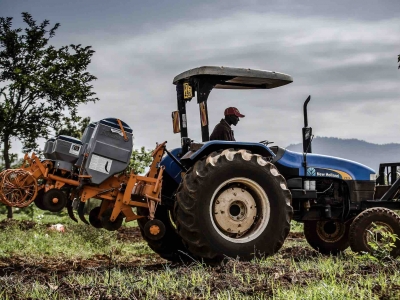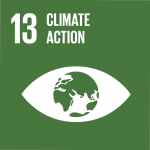Mission critical: bridging the gap between businesses and national climate plans

The global climate crisis is everyone’s business. Countries have committed to lower emissions and sustainable practices across all sectors. The public sector has long been supporting efforts to build resilience in the agriculture and land use sectors but achieving such climate action requires urgent collaboration with businesses in the food and land sector. Change is needed across the agriculture system, from farmland to store front – and this can only be accomplished with a joint effort from all players in the agribusiness industry.
Countries’ responses to lower their emissions, adapt to climate change, and meet the goals of the Paris Agreement are shaped by their nationally determined contributions (NDCs) and their National Adaptation Plans (NAPs). With improved public-private coordination, these country climate plans can drive concrete company action and can provide an attractive pipeline of private investment opportunities, and enable policy and regulatory environments for private sector engagement (PSE) in agriculture, forestry, and other land use (AFOLU) sectors. While clear entry points for PSE on climate action already exist, NDCs and NAPs can be important vehicles to determine which private sector actions are needed to transform agrifood systems.
Forty-one percent of all updated NDCs identified private sector activities, and of that 66 percent are in the agriculture sector. Yet, the actual engagement of the private sector in NDC processes has been limited, with only 13 percent of 85 updated NDCs having active collaboration with the private sector. These results indicate significant barriers are limiting private sector involvement in country climate plans.
Companies are beginning to commit to reduce greenhouse gas emissions by disclosing emissions, setting targets, and developing measures against those targets. A wide range of agrifood companies are managing climate risks by investing in climate resilient assets and infrastructure, and by integrating climate considerations into corporate strategies. However, some major gaps remain.
Although companies are in control of corporate emissions reduction and adaptation practices, they struggle to make their suppliers more accountable. With supply chains responsible for 88 percent of emissions, if companies do not work closely with their value chain partners in developing countries where they source, produce and sell, country commitments will remain unfulfilled.
The SCALA programme co-led by FAO and UNDP, with funding from the German Federal Ministry for Economic Affairs and Climate Action (BMWK) through the International Climate Initiative (IKI) and the World Business Council for Sustainable Development(WBSCD) convened a virtual dialogue in May 2022 with a range of agrifood companies, industry associations and public sector actors to discuss opportunities and gaps in implementing national climate plans. A few key messages highlight why companies in developing countries are struggling to align with governments and their value chain partners to achieve climate goals.
Many companies are uncertain about how their company goals can contribute to NDCs and NAPs. In some cases, businesses have already started investing in green technologies and low carbon farming, but public-facing companies may not understand how this contributes to country NDCs due to how public sector plans have been framed, although their objectives may be the same.
There are inadequate tangible examples and business models that reduce emissions and build resilience by working across value chain partners. There is limited traceability and data collection at producer level, and a lack of engagement with farmers and value chain partners. This may restrict companies from developing targets and measures across their own value chains.
Smaller companies face both financial and capacity barriers. Micro, small and medium enterprises have limited financial resources and instruments to pursue climate actions. SMEs also lack business capacity support to integrate climate considerations and matchmaking platforms to enhance knowledge on climate opportunities.
With these barriers in mind and to accelerate a shift from commitments to implementation, the SCALA programme is uniquely positioned to collaborate on solutions with multinational agribusinesses and domestic small and medium enterprises in the 12 SCALA partner countries through different means.
The programme recently launched the SCALA Private Sector Engagement Facility that will scale up the impact of SCALA across 12 non-programme countries over the next few years. The facility will draw upon the tools, emerging lessons and partnerships developed under SCALA to mobilize increased private sector engagement and investment to meet NAPs and NDCs.
The programme is developing a climate resilience net zero guidance note in collaboration with WBCSD. This guidance note is built on the results from over 50 surveys conducted with companies and financial institutions. With a focus on supply chain engagement at the production level, the guidance note outlines steps that agrifood businesses can take to accelerate and scale climate solutions across various commodities in different regions and countries.
SCALA is in dialogue with investor coalitions driving climate ambition. A group of 30 investors, organized by an investor network, have sent a letter to the FAO urging to set a roadmap for companies on how the food system can align with the Paris Agreement goal of limiting global warming to 1.5°C. Given the substantial investment needs, it is promising to see private investors challenge agrifood companies and governments to translate Paris goals into concrete actions.
SCALA is also co-organizing a series of knowledge exchange dialogues with WBCSD. These focus on practical examples of public-private partnerships, showcasing SCALA interventions and opportunities for collaboration between public and private actors to invest in low-carbon and resilient agricultural production while aligning with NDCs and NAPs. The first dialogue was held in May 2022, and the second exchange is scheduled for October 2022.
Businesses can rise to the challenge. This will require working closely with countries where they source, produce, and sell, and translating their climate goals so they are relevant to countries where they source from. Companies can share information with ministries and policymakers on what commitments they have made and what the country NDC entails for attracting investment in climate solutions.
The public sector should link up with companies that operate in their country and sensitize them on national climate goals and commitments. Sharpening investment signals from their NDCs and NAPs would help provide more clarity to businesses whilst they shape climate solutions for their supply chains, farmers and communities.
